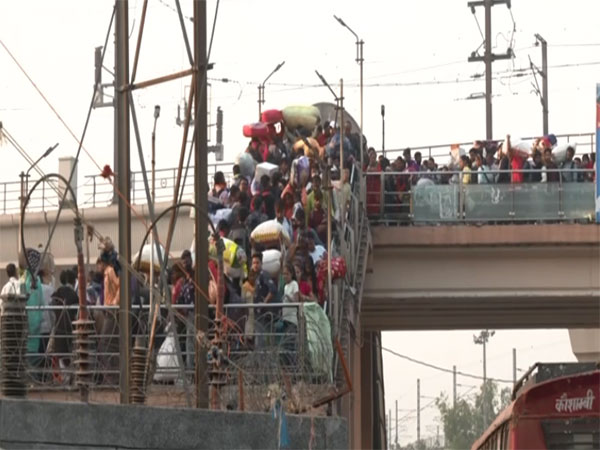
New Delhi: A huge throng gathered at the footbridge of the Anand Vihar Metro Station in the national capital ahead of the festival season. The people have assembled at Anand Vihar Bus Stop and Metro Station to leave for their hometowns for the auspicious festive season of Diwali and Chhat Puja.
Ahead of the holiday season, people were seen neglecting every safety measure as the tightly-packed crowd stood for hours in long queues with heavy loads of luggage over their heads.
Read Also: Kannada actor Chetan booked for hurting religious sentiments
"I have to go to Bulandshahr. I was in the queue for half an hour. It usually happens during festivals. I put my phone and money inside the bag in my pocket because in such a rush the possibility to get robbed increases, let's see if I would get a bus," said one of the passengers Satyapal who was waiting for the bus to his hometown.
Some people also complained about the hike in fares and said that the trains for short distances are unavailable. "The bus fare doubles during this festive season but I could not even go by train. The festival trains run only for long distances," said Vijendra Singh Thakur, another commuter at Anand Vihar bus stand.
The people leaving for their hometowns avoided wearing masks and did not even bother to follow any safety protocol amid the health crisis in the city. People had to stand in queue for an hour to enter the bus stand from the Metro Station, and almost all had heavy luggage on their heads. No one was wearing masks to maintain the highest degree of safety protocols amid the health crisis.
The health concerns in the country rose as World Health Organization Chief Scientist Soumya Swaminathan on Friday said that there were over 300 sub-variants and XBB being a recombinant virus is a matter of concern as it is immune evasive.
XBB, a recombinant lineage between two Omicron sublineages BJ.1 and BA.2.75, is a fast-spreading variant, which was seen to have caused a spike across Singapore recently.
Last week, a high-level meeting of Union Health Minister Mansukh Mandaviya with the senior health officials regarding the emergence of Omicron's new sub-variants concluded with the decision to continue masks and COVID-appropriate behaviour across the country.
Besides, the coronavirus, the country, especially the national capital New Delhi has another challenge of rising pollution levels even before the festive season began. A day before Diwali, the Delhiites woke up under a blanket of smoggy sky as the air quality remained in the "poor" category with the overall Air Quality Index (AQI) at 266.
According to the System of Air Quality and Weather Forecasting And Research (SAFAR), the AQI index in the overall Delhi region was in the 'poor' category at 266, 'very poor' category in the Delhi University area at 329, 'poor' quality in Mathura Road and Lodhi Road at 293 and 218 respectively on Sunday morning. The levels of PM 2.5 and PM 10 were recorded at 110 in the 'poor' and 237 in the 'moderate' category respectively.
Read also: Delhi Court Extends Jacqueline Fernandez's Interim Bail Till 10 November In PMLA Case
Meanwhile, Noida's overall air quality also stood in the 'very poor' category with the AQI at 311. However, the air quality in Gurugram stood in the 'moderate' category with an AQI of 139. An AQI between zero and 50 is considered good, 51 and 100 satisfactory, 101 and 200 moderate, 201 and 300 poor, 301 and 400 very poor, and 401 and 500 severe. Such high levels of pollution and smog levels become a cause of severe health diseases and ailments as they affect the breathe.
Meanwhile, the Delhi government has banned the production, storage, sale, and bursting of crackers this year as well as fines and jail terms in case of violation. In a bid to reduce vehicular pollution, the Delhi government also announced the 'Red Light On Gaadi Off' campaign.
Under the campaign, public representatives and officials will motivate commuters to turn their vehicles off at red lights in a bid to curb vehicular pollution. The air quality in the national capital is also affected because of stubble burning in surrounding Punjab, Uttar Pradesh, Haryana and Rajasthan in the winter.
As Delhi and the National Capital Region (NCR) continue to breathe toxic air, Chairman of Fortis Escorts Heart Institute Dr Ashok Seth said that the pollution not only damages the lungs but it also affects our hearts. (ANI)







